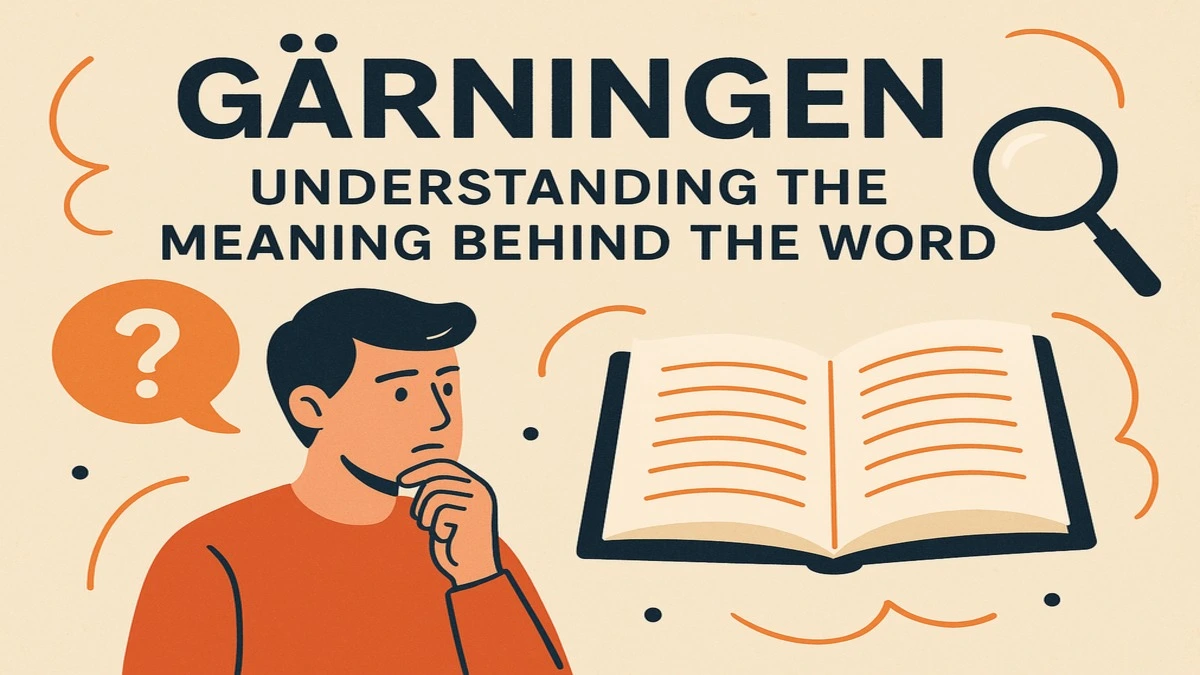GENERAL
What Is Gärningen? Understanding the Meaning Behind the Word

What if a single word could reveal a culture’s legal values, ethical standards, and linguistic roots — all at once? In Swedish, gärningen is such a word. It carries weight in courtrooms, classrooms, and conversations alike.
What does gärningen mean?
At its core, gärningen is the Swedish term for “the deed” or “the act”, typically referring to a concrete action, particularly in legal, moral, or behavioral contexts. While it may seem simple, its implications span linguistics, ethics, and justice. In this article, we examine its origins, cultural significance, legal usage, and its comparative representation across languages and societies.
The Etymology and Literal Meaning of Gärningen
Garningen is the definitive form of garning, which is in turn a syllabication of the Old Norse word gorrning, a syllabication of the verb gera (meaning “to do”). Gärning is structurally a feminine noun derived by the addition of the suffix -ning, which regularly turns verbs into abstract nouns, just as do in English.
Everyday Usage in the Swedish Language
In Swedish, gärningen appears frequently in idiomatic expressions and casual language. A common phrase is:
“Tagen på gärningen” – Caught in the act.
This expression is often used when someone is caught red-handed in the act of wrongdoing, such as stealing, cheating, or lying.
Other real-life usages include:
- Referring to a significant historical event (en hjältemodig gärning – a heroic act)
- Describing moral failure (en skamlig gärning – a shameful deed)
The Role of Gärningen in Swedish Law
In legal contexts, gärningen takes on a sharply defined role. It refers specifically to the criminal act itself, separate from motive or intent.
In Swedish legal terminology, gärningen represents the objective act — the observable behavior that constitutes a crime.
Example in criminal law:
- “För att dömas måste gärningen vara uppsåtlig.”
(To be convicted, the deed must be intentional.)
This legal emphasis on action over intent aligns with broader principles in Scandinavian justice, which prioritize evidence, objectivity, and proportional response.
Cultural and Ethical Significance
In Scandinavian societies, personal integrity is often measured by one’s actions rather than one’s words or beliefs. Gärningen, then, becomes a reflection of character and accountability.
“Du döms inte bara för dina ord – utan för din gärning.”
You’re not judged only by your words, but by your deeds.
This view resonates in areas such as:
- Workplace ethics – Emphasizing follow-through over promises.
- Social conduct – Valuing transparency and consistency in behavior.
- Parenting and education – Teaching children the consequences of their actions, not just their thoughts.
Historical and Literary Usage
In classic Swedish literature and folk tales, gärningen is often tied to morality. Protagonists are rewarded or punished based on their actions, regardless of their intentions.
One famous literary motif involves atonement for one’s gärningar — a narrative arc where a character must make amends through new, redeeming actions.
💡 Tip:
In Swedish crime fiction, such as novels by Stieg Larsson or Henning Mankell, gärningen often defines the turning point in a plot — the moment the criminal act occurs.
Religious and Philosophical Perspectives
In Lutheran theology, particularly influential in Sweden, gärning plays a crucial role in the longstanding debate between faith and works.
“Människan blir rättfärdig genom tron – inte gärningarna.”
Man is justified by faith, not by deeds.
However, modern interpretations stress that faith should naturally manifest in good deeds, creating a synthesis between belief and action. This philosophical nuance reinforces the idea that gärningen isn’t just external — it’s a reflection of internal conviction.
Comparative Linguistic Insights
Let’s compare how gärningen aligns with equivalent terms in other languages:
| Language | Equivalent Term | Connotation |
| Swedish | Gärningen | The act or deed (formal/legal/moral) |
| English | The act/deed | Neutral; context-driven |
| German | Die Tat | Strong legal/criminal tone |
| Danish/Norwegian | Gerning | Very similar to Swedish usage |
| French | L’acte | Often formal or ceremonial |
Gärningen in Digital Culture
In today’s digital age, actions taken online are increasingly seen as real deeds. Whether it’s posting harmful content, sharing misinformation, or cyberbullying, users are held accountable for their digital gärningar.
⚠ Warning: Many individuals assume online behavior is exempt from real-world consequences. In Sweden, even digital harassment or threats are treated as prosecutable gärningar.
The term’s relevance continues to evolve in virtual spaces, reinforcing that “what you do” — regardless of where — defines who you are.
Legal vs. Moral: Two Sides of Gärningen
While both law and ethics deal with actions, the same deed (gärning) can be judged differently depending on the lens.
- A legal system may deem a gärning not guilty if it lacks intent.
- A moral framework might still consider it wrong if it causes harm.
This dual interpretation makes gärningen a fascinating intersection of objective analysis and subjective reflection.
When Gärningen Defines Identity
In many Swedish proverbs and community norms, who you are is measured not by your background or beliefs, but by your gärningar. Your consistent actions build (or erode) trust and social standing.
Quote:
“Man är sina gärningar.”
One is their deeds.
Conclusion: Why Gärningen Still Matters
In every context — linguistic, legal, ethical, or digital — gärningen holds enduring significance. It reminds us that intentions alone are not enough. Ultimately, what matters is what we do. For Swedish speakers, gärningen serves as both a linguistic tool and a cultural compass, pointing toward responsibility, character, and truth in action.
-

 BIOGRAPHY9 months ago
BIOGRAPHY9 months agoBehind the Scenes with Sandra Orlow: An Exclusive Interview
-

 HOME1 year ago
HOME1 year agoDiscovering Insights: A Deep Dive into the //vital-mag.net blog
-

 HOME1 year ago
HOME1 year agoSifangds in Action: Real-Life Applications and Success Stories
-

 BIOGRAPHY1 year ago
BIOGRAPHY1 year agoThe Woman Behind the Comedian: Meet Andrew Santino Wife




























